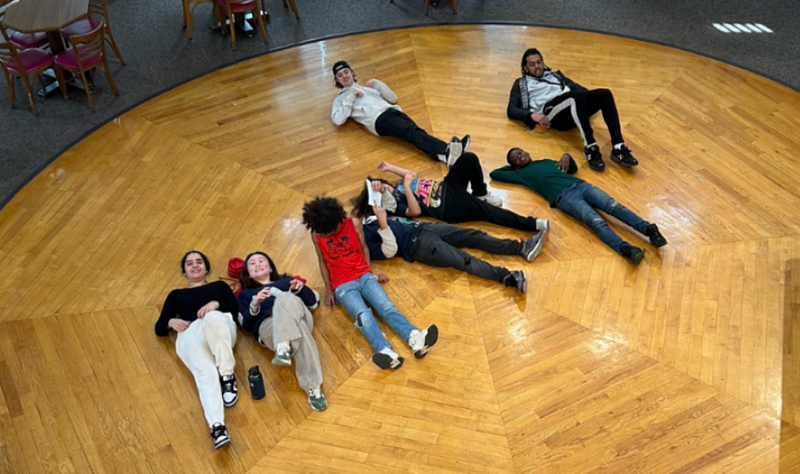
Co-Op’s beloved Hamilton Utica Mentorship’s (HUM) program has expanded this school year. The goal of HUM is to provide academic and social support to local Utica students. This year, the program has seen a massive increase in engagement, with turnout of Utica students nearly doubling. In years past, programming took place at the local community center in Utica, but this year, HUM has taken a different approach, instead offering programming on Hamilton’s campus. Student leader Nestor Martinez ’25 reflected on the expansion of HUM:
“This year we decided to share Hamilton’s resources and physical location with the broader community. Our previous work, though impactful, needed to form deeper connections between Adrean Terrace and Hamilton.”
Utica mentees visit Hamilton’s campus weekly and engage in a wide range of activities, from playing soccer in the field house, to exploring the Wellin to studying in academic buildings and making s’mores at the Glen House.
Kendall Bocklet ’26 and Nestor Martinez ’25, student leaders of this CO-OP Program, are responsible for facilitating educational, artistic and academic activities. They reach out to various staff members and students across all grades with different expertises on campus. By asking mentees about their favorite activities and observing who is engaged in which types of activities, they have catered to the interests of these students by engaging professors and students from a variety of disciplines. This provides the opportunity for each student can develop their interests and passions.
On the students’ first visit to campus of the school year, Martinez and Bocklet organized an activity for them to appreciate Hamilton’s beautiful scenery in the warm weather. Mentors led students through the glen to take pictures of nature and enjoy the fresh air. Students enjoyed taking pictures of the scenery and the opportunity to run around outside. At the end of the walk, students and mentors congregated in the DMC to enjoy pizza and snacks.
Assistant Chemistry Professor Wesley Kramer led a highly creative science experiment in the DMC, which, although messy, was a wonderful opportunity for these students to collaborate and learn. Students learned how to create mini solar panels using raspberry juice and electroscopic plates. Beginning the lesson by showing examples of conduction with a conductivity meter, students then got to take the reins themselves. This involved labeling the electroscopic plates, then shaking up a bag of raspberries and dipping an electrically charged cube.
During the following visit to campus, HUM students were able to revisit their favorite activity of their visit to campus during the end of the Spring semester: rock climbing. Rock wall employees helped to belay students and mentors did their best to provide instruction to guide students to the right foot and hand grips. “The kids were super excited about rock climbing and for many of them it was their first time,” said Abby Baron ’26, a mentor for HUM. While some students enjoyed scaling the rock wall, others who were less interested enjoyed playing Spot It and nail painting.
During the visit to Utica this past week, mentors led a mathematics activity with a card deck for students to practice multiplication and division. In recent weeks, students have outlined their academic and personal goals for the semester, created their own zines and engaged in many heated soccer matches.
Hamilton Utica Mentorship will continue to expand into more disciplines across campus, including more professors and students in the program. “As the program continues to grow, I’m personally hoping it continues to foster communication between Hamilton and Utica. I feel that too few students engage with Utica and all the city has the offer. I hope that we can get more students involved in mentoring and perhaps expand out to other low income housing communities. It would be incredible to have enough mentees that we would be able to split students into age groups to more adequately tailor the mentee experience,” said Martinez.
Baron concurred, “This program is important because it exposes the kids to activities, lessons and people they might not otherwise encounter which can make a huge impact on them as they’re growing up.” HUM is an amazing way to build connections and engage with the community. Seeing the program as a conduit for change, Martinez articulated that he would “like to see the program start to encourage students to look at societal systems critically which is something lacking in schools, though it’ll take time to build up to that point.”

























